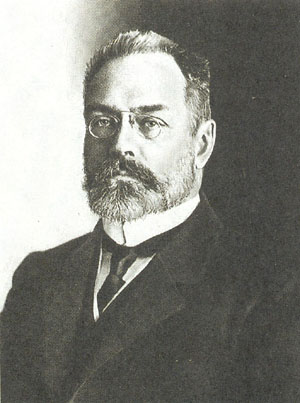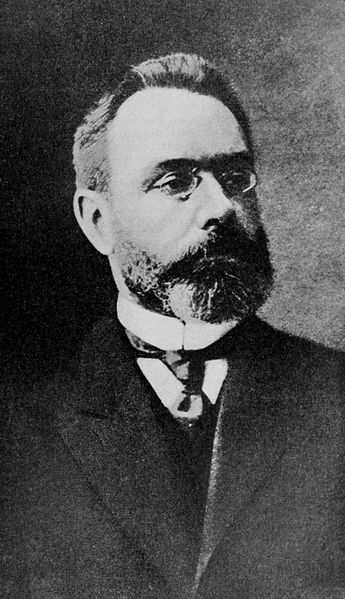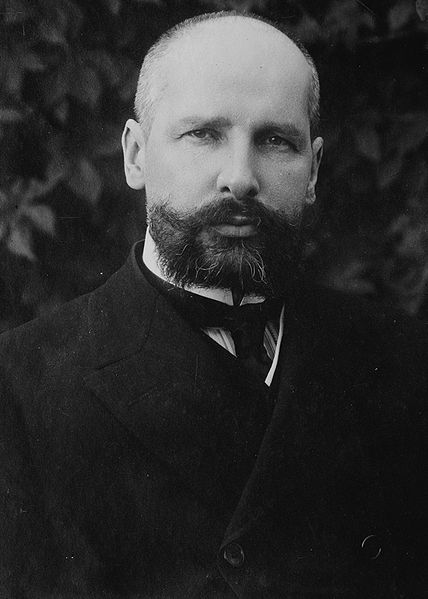<Back to Index>
- Founder of the Progressive Bloc and Minister of War in the Provisional Government Alexander Ivanovich Guchkov, 1862
- 3rd Prime Minister of Imperial Russia Pyotr Arkadyevich Stolypin, 1862
PAGE SPONSOR


Alexander Ivanovich Guchkov (Russian: Алекса́ндр Ива́нович Гучко́в) (14 October 1862, Moscow – 14 February 1936) was a Russian politician, Chairman of the Duma and Minister of War in the Russian Provisional Government.
Unlike most of the conservative politicians of that time, Alexander Guchkov did not belong to the Russian nobility. His father was the grandson of a peasant and his mother was French. He was a rich capitalist, head of a huge insurance company. In October 1906 he became the head of the Union of 17 October. By that time he was known mostly for hazardous acts which included volunteering for the Boer army in the Second Boer War, where he was wounded and taken prisoner, and (again voluntary) taking care of Russian prisoners after the Battle of Mukden. He also fought numerous duels.
In 1912 the Octobrists were defeated in elections to the Fourth Duma, losing over 30 seats. Guchkov in particular was defeated in his constituency in Moscow. The remaining Octobrists in Duma split into two fractions. By 1915 many local party branches and the main party newspaper "Voice of Moscow" ceased to exist.
With the outbreak of World War I
Guchkov became the head of Military - Industrial Committee - an
organization, created by industrial magnates in order to supply the
army. In 1915 Guchkov was among the founders of Progressive Bloc, which
demanded the establishment of ministerial responsibility before the
Duma. Nicholas II constantly refused to satisfy this demand. Later
Guchkov reported that members of the Progressive Bloc would consider a coup d'etat, but did not undertake any action. Shortly after the Petrograd riots
in February 1917, Guchkov, along with Vasily Shulgin, came to the army
headquarters near Pskov to persuade the Tsar to abdicate. On 2 March
1917 Nicholas II abdicated.
After the February Revolution the Union of 17 October legally ceased to exist. Guchkov held the office of War Minister in the Russian Provisional Government until 29 April. He was forced to resign after public unrest, caused by Milyukov's Note. Along with his fellow Mikhail Rodzianko he continued to struggle for establishing a "strong government". He supported Lavr Kornilov and was arrested, when his coup d'etat attempt failed, but released the next day.
After the October Revolution Guchkov provided financial support for the White Guard. When eventual defeat of the White Guard became inevitable, he emigrated, first going to Germany. He died in 1936 in Paris.
Guchkov has become something of a cult figure
in recent years: his reputation in Russia has grown after a documentary
on the main state channel, which included an interview with then
President Vladimir Putin.
In the documentary, Putin revealed that Guchkov had been one of his
childhood heroes for the way in which he tried to bring democracy to the
country.

Pyotr Arkadyevich Stolypin (Russian: Пётр Арка́дьевич Столы́пин, 14 April [O.S. 2 April] 1862 – September 18 [O.S. September 5] 1911) served as the leader of the third Duma, from 1906 to 1911. His tenure was marked by efforts to counter revolutionary groups and by the implementation of noteworthy agrarian reforms. Stolypin's reforms aimed to stem peasant unrest by creating a class of market oriented smallholding landowners. He is considered one of the last major statesmen of Imperial Russia with clearly defined public policies and the determination to undertake major reforms.
Stolypin was born in Dresden, Saxony, on 14 April 1862. His family was prominent in the Russian aristocracy, and Stolypin was related on his father's side to the poet Mikhail Lermontov. His father was Arkady Dmitrievich Stolypin (1821 – 99), a Russian landowner, descendant of a great noble family, a general in the Russian artillery, and later Commandant of the Kremlin Palace. His mother was Natalia Mikhailovna Stolypina (née Gorchakova; 1827 – 89), the daughter of the Commanding General of the Russian infantry during the Crimean War and later the Governor General of Warsaw Prince Mikhail Dmitrievich Gorchakov.
From 1869, Stolypin spent his childhood years in Kalnaberžė manor (now Kėdainiai district of Lithuania), built by his father, in what remained his favorite residence for the rest of life. In 1876, the Stolypin family moved to Vilnius, where they bought a house, so that their son could study at the local grammar school. He received a good education at St. Petersburg University and entered government service upon graduating in 1885, joining the Ministry of State Property. Four years later Stolypin was elected marshal of the Kovno Governorate. This public service gave him an inside view of local needs and allowed him to develop administrative skills. He was fascinated by the common lifestyle of the northwestern provinces (especially what is now Lithuania, where his family held estates) and sought to propagate their privately owned, single family farmsteads throughout the Russian Empire.
In 1884, Stolypin married Olga Borisovna Neidhardt, the daughter of a prominent Russian family. They raised five daughters and a son.
In 1902 Stolypin was appointed governor in Grodno, where he was
the youngest person ever appointed to this position. Next, he became
governor of Saratov,
where he became known for suppressing peasant unrest in 1905, and
gained a reputation as the only governor able to keep a firm hold on his
province during this period of widespread revolt. Stolypin was the
first governor to use effective police methods against suspected
troublemakers and some sources suggest that he had a police record on
every adult male in his province. His successes as provincial governor
led to Stolypin being appointed interior minister under Ivan Goremykin.
A few months later, Nicholas II appointed Stolypin to replace Goremykin as Prime Minister. Russia in 1906 was plagued by revolutionary unrest and discontent was widespread among the population. With wide support, leftist organizations waged campaigns against the autocracy; throughout Russia, police officials and bureaucrats were being assassinated. To respond to these attacks, Stolypin introduced a new court system that allowed for the arrest and speedy trial of accused offenders. Over three thousand suspects were convicted and executed by these special courts between 1906 and 1909. The gallows were hence referred to as "Stolypin's necktie".
He dissolved the First Duma on July 21 [O.S. July 8] 1906, despite the reluctance of some of its more radical members, in order to facilitate government cooperation. Stolypin introduced land reforms in order to resolve peasant grievances and quell dissent. He also tried to improve the lives of urban laborers and worked towards increasing the power of local governments.
In July 1906 he was elected as Prime Minister. He aimed to create a moderately wealthy class of peasants that would support societal order.
Stolypin changed the nature of the Duma to attempt to make it more willing to pass legislation proposed by the government. After dissolving the Second Duma in June 1907 (Coup of June 1907), he changed the weight of votes more in favor of the nobility and wealthy, reducing the value of lower class votes. This affected the elections to the Third Duma, which returned much more conservative members, more willing to cooperate with the government.
In the spring of 1911, Stolypin proposed a bill, which was not
passed, prompting his resignation. He proposed spreading the system of zemstvo
to the southwestern provinces of Russia. It was originally slated to
pass with a narrow majority, but Stolypin's political opponents had it
defeated. Afterwards he resigned as Prime Minister of the Third Duma.
In September 1911 Stolypin traveled to Kiev despite police warnings that an assassination plot was afoot. He traveled without bodyguards and refused to wear his bullet proof vest.
On September 14 [O.S. September 1] 1911, while he was attending a performance of Rimsky - Korsakov's The Tale of Tsar Saltan at the Kiev Opera House
in the presence of the Tsar and his two eldest daughters, the Grand
Duchesses Olga and Tatiana, Stolypin was shot twice, once in the arm and
once in the chest, by Dmitri Bogrov (born Mordekhai Gershkovich), who was both a Jewish leftist radical and an agent of the Okhrana.
Stolypin was reported to have coolly risen from his chair, removed his
gloves and unbuttoned his jacket, exposing a blood soaked waistcoat. He
sank into his chair and shouted "I am happy to die for the Tsar" before
motioning to the Tsar in his imperial box to withdraw to safety. Tsar
Nicholas remained in his position and in one last theatrical gesture
Stolypin blessed him with a sign of the cross. The next morning the
distressed Tsar knelt at Stolypin's hospital bedside and repeated the
words "Forgive me". Stolypin died four days later. Bogrov was hanged
10 days after the assassination; the judicial investigation was halted
by order of Tsar Nicholas II.
This gave rise to suggestions that the assassination was planned not by
leftists, but by conservative monarchists who were afraid of Stolypin's
reforms and his influence on the Tsar. This, however, has never been
proven. Stolypin was buried in the Pechersk Monastery (Lavra) in Kiev, the capital of present day Ukraine).
Opinions about Stolypin's work are divided. In the unruly atmosphere after the Russian Revolution of 1905 some say that he had to suppress violent revolt and anarchy. However, historians disagree over how realistic Stolypin's policies were. The standard view of most scholars in this field has been that he had little real chance of reforming agriculture since the Russian peasantry was so backward and he had so little time to change things. Others, however, have argued that while it is true that the conservatism of most peasants prevented them from embracing progressive change, Stolypin was correct in thinking that he could "wager on the strong" since there was indeed a layer of strong peasant farmers. This argument is based on evidence drawn from tax returns data, which shows that a significant minority of peasants were paying increasingly higher taxes from the 1890s, a sign that their farming was producing higher profits.
There remains doubt whether, even without the interruption of Stolypin's murder and the First World War,
his agricultural policy would have succeeded. The deep conservatism
from the mass of peasants made them slow to respond. In 1914 the strip
system was still widespread, with only around 10% of the land having
been consolidated into farms.
Most peasants were unwilling to leave the security of the commune for
the uncertainty of individual farming. Furthermore, by 1913, the
government's own Ministry of Agriculture had itself begun to lose
confidence in the policy.
After Stolypin's elder brother was killed in a duel, Stolypin challenged his brother’s duelist. As a result, Stolypin was wounded in the right arm, which was almost paralyzed after the incident.
Stolypin's death was allegedly prophesied by Grigori Rasputin, who is reported to have shouted, "Death is after him! Death is driving behind him!" as he ran after the imperial couple in the crowd outside the opera house.
In a 2008 television poll to select "the greatest Russian", Stolypin placed second, behind Alexander Nevsky and followed by Joseph Stalin.
He was a keen taxidermist and had accrued one of the largest collections of animals in the world.